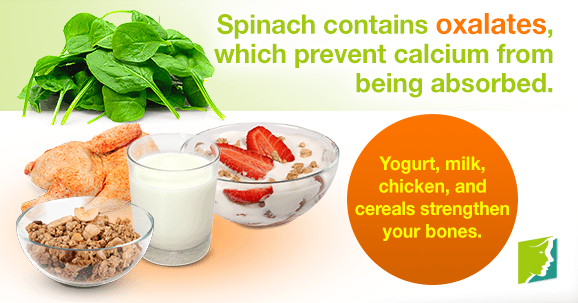Due to their increased risk of developing osteoporosis during menopause, many women approaching this phase often question whether they should eliminate spinach from their diets. Despite being rich in the calcium the body needs, spinach also contain oxalates which prevent calcium from being absorbed into our bodies. But do the veggies benefits outweigh its flaws?
Spinach and Calcium
Spinach contains many valuable vitamins and minerals such as potassium, magnesium, vitamin K, and calcium. However, spinach also contains oxalates which prevent bones from absorbing calcium. As a result, women who have osteoporosis, or are more prone to developing it, are often advised to stop eating spinach.
Keep Eating Spinach
The multiple nutrients and health benefits spinach possesses significantly outweighs any of its negative effects on calcium. Spinach not only helps protect the heart, it also helps prevent cancer and improve brain functioning. If you're concerned about calcium intake consider increasing your intake of some of the other calcium rich foods that help to improve bone density.
Foods that are known to be rich in calcium include yogurt, milk, sardines, and soybeans. Consuming spinach at the same time as calcium rich foods will not negate the calcium content or absorption efficiency of these products. For example, if you have a spinach casserole that contains cheese, the calcium from the cheese will still find its way to your bones.
The Facts about Calcium and Nutrition
If you have osteoporosis or are concerned about your chances of developing it, while it's okay to keep eating spinach, there certain food types that you should avoid. Generally, these foods are worth avoiding because in addition to possessing lower levels of calcium, they also inhibit its absorption. When consumed, these foods go straight to the bones and remove existing calcium deposits. Try to limit your intake of the following:
- Table salt
- Caffeine
- Soft drinks that include phosphoric acid
However, in order to strengthen your bones increase your consumption of:
- Protein. chicken, turkey, and pork
- Dairy. milk, yogurt, and cheese
- Foods rich in vitamin D. fortified cereals, eggs, and saltwater fish.
More Information about Osteoporosis
Roughly one third of women around 50 and above will incur fractures and broken bones as a consequence of low bone density. Click the following link to learn more about osteoporosis and nutrition.
Sources
- Cleveland Clinic.(n.d)."Menopause and Osteoporosis".Retrieved from http://my.clevelandclinic.org
- American Physical Therapy Association.(n.d).Retrieved from. American Physical Therapy Association. www.apta.org.
- New York State Department of Health.(n.d)."Calcium and Healthy Bones"Retrieved from www.health.state.ny.us.
- National Osteoporosis Foundation.(n.d)."Prevention: Who's at Risk".Retrieved from www.nof.org.



